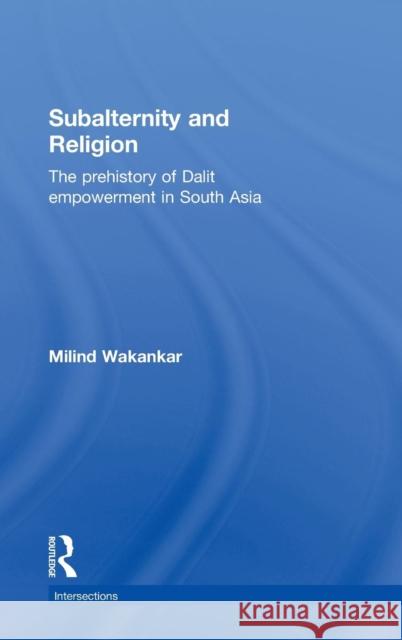Subalternity and Religion: The Prehistory of Dalit Empowerment in South Asia » książka
Subalternity and Religion: The Prehistory of Dalit Empowerment in South Asia
ISBN-13: 9780415778787 / Angielski / Twarda / 2010 / 204 str.
Subalternity and Religion: The Prehistory of Dalit Empowerment in South Asia
ISBN-13: 9780415778787 / Angielski / Twarda / 2010 / 204 str.
(netto: 744,80 VAT: 5%)
Najniższa cena z 30 dni: 730,42 zł
ok. 22 dni roboczych
Bez gwarancji dostawy przed świętami
Darmowa dostawa!
This book explores the relationship between mainstream and marginal or subaltern religious practice in the Indian subcontinent, and its entanglement with ideas of nationhood, democracy and equality. With detailed readings of texts from Marathi and Hindi literature and criticism, the book brings together studies of Hindu devotionalism with issues of religious violence. Drawing on the arguments of Partha Chatterjee, Martin Heidegger and Jacques Derrida, the author demonstrates that Indian democracy, and indeed postcolonial democracies in general, do not always adhere to Enlightenment ideals of freedom and equality, and that religion and secular life are inextricably enmeshed in the history of the modern, whether understood from the perspective of Europe or of countries formerly colonized by Europe. Therefore subaltern protest, in its own attempt to lay claim to history, must rely on an idea of religion that is inextricably intertwined with the deeply invidious legacy of nation, state, and civilization. The author suggests that the co-existence of acts of social altruism and the experience of doubt born from social strife - 'miracle' and 'violence' - ought to be a central issue for ethical debate. Keeping in view the power and reach of genocidal Hinduism, this book is the first to look at how the religion of marginal communities at once affirms and turns away from secularized religion. This important contribution to the study of vernacular cosmopolitanism in South Asia will be of great interest to historians and political theorists, as well as to scholars of religious studies, South Asian studies and philosophy.
This book explores the relation between mainstream and marginal or subaltern religious practice in the Indian subcontinent. It argues that the religious thinking of marginalized communities such as low-castes and converts is notable because it ‘holds together’ two contradictory ideas, namely radical doubt and radical affirmation. The author detects such a critical notion of faith not in everyday life but in moments of violence, or more strictly in the everydayness (which is to say the unsettling banality) of violence. He suggests that the co-existence of acts of social altruism and the experience of doubt born from social strife—‘miracle’ and ‘violence’— ought to be a central issue for ethical debate. Keeping in view the power and reach of genocidal Hinduism, this book is the first to look at how the religion of marginal communities at once affirms and turns away from secularized religion.
Following Gayatri Chakravorty Spivak and the Subaltern School of Indian historians, the book takes issue with the assumption among Indian elites that an ex-colonial nation-state such as India could lay claim to the idea of being modern solely by endorsing this separation. Here the book has recourse to the critical legacy of Martin Heidegger and Jacques Derrida in arguing that religion and secular life, the theological and the political are inextricably enmeshed in the history of the modern, whether understood from the perspective of Europe or of countries formerly colonized by Europe.
The book argues that the low-caste account of divinity as the ‘place’ - which is also the space of violence - where the disappearance of God is experienced has the potential to irradiate and transform the social and religious core of Indian society.











